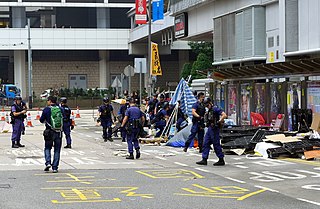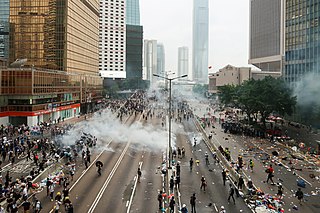
When Heaven Burns is a 2011 Hong Kong television serial produced by TVB and starring Bowie Lam,Moses Chan,Kenny Wong,Charmaine Sheh and Angela Tong. First revealed during TVB's Sales Presentation 2009 in 2008,filming took place in late 2009 to early 2010,with the first episode airing both in Hong Kong and TVB's overseas affiliates and partners on 21 November 2011. On 27 December 2011,the show was blacklisted by the Chinese State Administration of Radio,Film,and Television,making it the first Hong Kong television drama to be censored in Mainland China in more than two decades.

Sergeant Tabloid is a Hong Kong television drama produced by TVB under executive producer Nelson Cheung. The drama tells the story of female police officers of the Hong Kong Police Force,using their perspectives to look at issues of modern women experience in society. Sergeant Tabloid first aired on TVB's overseas affiliates and partners from 2 to 27 April 2012.

Alice Mak Mei-kuen is a Hong Kong politician,currently serving as Secretary for Home and Youth Affairs. She was formerly a member of the Legislative Council of Hong Kong for the Election Committee,representing the Hong Kong Federation of Trade Unions. She graduated from Department of English of the Chinese University of Hong Kong. She has been a member of the Kwai Tsing District Council since 1993,and represented the Wai Ying constituency until 2019.

Civil unrest occurred in Mong Kok,Hong Kong from the night of 8 February 2016 until the following morning. The incident escalated from the government's crackdown on unlicensed street hawkers during the Chinese New Year holidays. Eventual violent clashes broke out between police and protesters,resulting in injuries on both sides.

Jimmy Ng Wing-ka,JP is a solicitor and businessman in Hong Kong. He is the vice-president of the Chinese Manufacturers' Association of Hong Kong (CMAHK). In the 2016 Legislative Council election,Ng ran unopposed in the CMAHK's Industrial (Second) functional constituency,succeeding Lam Tai-fai in the seat.

The Special Tactical Contingent,nicknamed the "Raptors",commonly known as the Special Tactical Squad (STS),is a specialist riot contingent of the Hong Kong Police Force under the command of the Police Tactical Unit (PTU).

The 2022 Hong Kong Chief Executive election was held on 8 May 2022 for the 6th term of the Chief Executive (CE),the highest office of the Hong Kong Special Administrative Region (HKSAR). Incumbent Carrie Lam,who was elected in 2017,declined to seek a second term for family reasons and finished her term on 30 June 2022. Former Chief Secretary John Lee was the sole candidate approved by the central government of China in the election and the only candidate to be nominated. He received 1,416 electoral votes (99.44%) and assumed office on 1 July 2022.
Events in the year 2019 in Hong Kong.

The 2019–2020 Hong Kong protests were a series of demonstrations against the Hong Kong government's introduction of a bill to amend the Fugitive Offenders Ordinance in regard to extradition. It was the largest series of demonstrations in the history of Hong Kong.

The 2019 Yuen Long attack,also known as the 721 incident,refers to a mob attack that occurred in Yuen Long,a town in the New Territories of Hong Kong,on the evening of 21 July 2019. It took place in the context of the 2019–2020 Hong Kong protests. An armed mob of suspected triad members dressed in white indiscriminately attacked civilians on streets with steel rods and rattan canes,before attacking members of the public in nearby Yuen Long station including the elderly,children,protesters returning from a demonstration in Sheung Wan on Hong Kong Island,journalists and lawmakers.

The period from March to June 2019 in the 2019–2020 Hong Kong protests is considered the early stage of the movement. Until the first mass demonstrations in June,protests were focused on the withdrawal of the extradition bill. In June,protesters started to lay out five demands. The additional four demands concerned the reactions of the Hong Kong government and especially,the police to the protests,and called more broadly for full democracy in the city.

The founding cause of the 2019–2020 Hong Kong protests was the proposed legislation of the 2019 Hong Kong extradition bill. However,other causes have been pointed out,such as demands for democratic reform,the Causeway Bay Books disappearances,or a general fear of losing a "high degree of autonomy". The Hong Kong protests are unique in this respect from democracy protests in general,which are often provoked by economic grievances. Subsequent actions by the police,such as mass arrests and police violence,as well as what was perceived to be an illegitimate legislative process of the bill,sparked additional protests throughout the city.

The Hong Kong Police Force (HKPF) struggled with corruption among its ranks from the 1940s until the 1970s. It gained the nickname "Asia's Finest" after undergoing reforms in 1979. Since the 2010s,the force has faced allegations of police brutality,sexual assault,excessive use of violence,falsification of evidence,and a lack of professionalism.

The conduct of the Hong Kong Police Force is a subject of controversy during the 2019–2020 Hong Kong protests. Tactics employed by the force have led to misconduct allegations and protesters have accused the Hong Kong government of using the police as a method to resolve a "lingering political crisis." Actions taken by the police force and the Hong Kong government have caused mixed reactions inside Hong Kong and in the general international community. Allegations against the police include excessive use of force,force against unspecific targets,and arrest without warrant. These allegations have been presented in various media both supporting and detracting from the complaints,such as through amateur video. In general,the spirit,rumors,videos,and other media shared by the public have caused a drop in support for the police force,and an Amnesty International report accused the police of using excessive force against civilians. One of the objectives of the 2019–2020 protests is establishment of an independent inquiry system into said allegations.

San Uk Ling Holding Centre is a detention centre in Man Kam To,Hong Kong. Located a few hundred metres away from the Man Kam To Control Point,a border crossing facility between Hong Kong and China,the centre opened in July 1979 to house illegal immigrants prior to their repatriation.

The 12 June 2019 Hong Kong protest,also known as "612 incident". refers to an incident of intense confrontation between anti-extradition bill protesters and the Hong Kong Police Force,occurring on 12 June 2019 outside the Government Headquarters in Admiralty,Hong Kong Island. The protest was sparked by the government's introduction of the controversial Fugitive Offenders amendment bill,which was set to go through second reading on 12 June despite mass opposition.

Cheng Lai-king is a Hong Kong politician who served as District Councillor for the Castle Road constituency,and as former chairwoman of Central and Western District Council. She is a member of the Democratic Party and a registered social worker.
Wong Ho-wa is a Hong Kong data scientist and pro-democracy activist. He led the open government data community g0vhk from 2016 to 2021. He was an Election Committee member representing the information technology (IT) industry from 2016 to 2021 and ran for the Information Technology constituency in the 2020 Hong Kong legislative election as part of the pro-democratic caucus.
Nabela Qoser is a Hong Kong journalist and broadcaster. Until end of May 2021,she was Assistant Programme Officer at Radio Television Hong Kong (RTHK) and co-hosted the RTHK talk show. She is the first Cantonese-language news reporter of non-ethnic Chinese descent in Hong Kong. She attracted media attention in 2019 following her outspoken questioning of government officials.
A by-election was held for the Election Committee constituency in the Legislative Council of Hong Kong on 18 December 2022 after resignation of four Legislative Councillors appointed to the new government led by Chief Executive John Lee Ka-chiu.















